The Alliance is dedicated to providing culturally relevant and accessible services for survivors who self-identify as LGBTQ+. We also collaborate with LGBTQ+ groups, organizations, and community leaders throughout the state in an effort to highlight and combat sexual violence in historically marginalized communities.
Perhaps for some of you, I am the face of one of your fears. Because I am a woman, because I am Black, because I am lesbian, because I am myself – a Black woman warrior poet doing my work – come to ask you: are you doing yours?
— Audre Lorde
Assumptions & Dynamics
The Alliance believes that LGBTQ+ identities are not the consequence of trauma, but rather valid and beautifully nuanced identities. We believe that LGBTQ+ people face systemic and historical oppression and experience additional barriers when seeking services. We also believe that self-determination and self-identification are important and integral to a survivor’s identity, and we celebrate the uniqueness of each survivor.
Sexual violence happens in all communities; however, we know that many marginalized communities disproportionately experience sexual violence and have less access to interventions when they are victimized. We live in a society that provides rights and privileges to cisgender heterosexual people, but LGBTQ+ people are not always afforded the same rights and privileges. LGBTQ+ people are often viewed as deviant, less than, or other. This societal stigma not only makes LGBTQ+ people more vulnerable to experiencing violence, but it also creates challenges when LGBTQ+ survivors seek services.
Dominant narratives about sexual violence cast men as perpetrators and women as victims, which contributes to the erasure of LGBTQ+ survivors and the isolation that many LGBTQ+ survivors feel.
When people from marginalized communities share their experiences with oppression, they are often met with disbelief or are victim blamed. This disbelief can be traumatic and isolating, and it can prevent LGBTQ+ survivors from accessing needed services or interventions.
In addition, some LGBTQ+ individuals experience additional oppression and marginalization through other aspects of their identity. For example, BIPOC LGBTQ+ individuals experience increased violence, oppression, and barriers to assistance due to the intersectionality of their marginalized identities. As various forms of inequality and oppression often interact and exacerbate each other, it is essential that those who advocate for and serve LGBTQ+ survivors of sexual violence are aware of the intersectionality of structural inequality and systemic oppression and its impact on the lives of LGBTQ+ people. Advocates may need to do extra work to build trust with survivors and ensure that they are providing culturally relevant and accessible services through an intersectional lens.
If I don’t define myself for myself, I would be crunched into other people’s fantasies of me and eaten alive.
— Audre Lorde
Queer Caucus Against Sexual Assault
Are you a staff member of The Alliance or one of The Alliance’s member centers who self-identifies as LGBTQ+? We encourage you to join our Queer Caucus Against Sexual Assault!
Fill out the interest form to join QCASA.
Advocacy & Language
When working with individuals from LGBTQ+ communities, it is important to understand the language used.
Language can be used in a way that is either validating or harmful to LGBTQ+ people. Learning to use respectful and validating language is a constant process because language is always evolving and changing. While new terms are continually being added, old terms are becoming outdated and disfavored, and previously offensive terms have been reclaimed. We have compiled a list of basic terms, concepts, and definitions that will help create a foundation of knowledge and understanding to assist with navigating any future language changes.
Terms & Definitions
The definitions provided are those most commonly used. It is important to recognize that even if a majority of people define and use a term a certain way, there may be a large number of people who use that term differently or assign another definition to that term. Additionally, it is important that terms relating to aspects of a person’s identity are used properly as adjectives. Using these terms as either nouns or verbs suggests that the aspect of that person’s identity is either all-encompassing of their entire self (when used as a noun) or a choice or an action (when used as a verb).
AGENDER: Describes a person who does not identify with a particular gender.
AROMANTIC / ARO: A lack of romantic attraction or interest. As romantic attraction exists on a different spectrum than sexual attraction, not all people who identify as aromantic also identify as asexual and vice versa.
ASEXUAL / ACE: A lack of sexual attraction or sexual interest. As sexual attraction exists on a different spectrum than romantic attraction, not all people who identify as asexual also identify as aromantic and vice versa.
BISEXUAL: Describes a person who is capable of being sexually and/or romantically attracted to more than one gender(s).
CISGENDER / CIS: Describes a person whose gender identity is aligned with the sex they were assigned at birth.
CISSEXISM: A system of oppression that upholds that there are only two genders, which are considered
the norm. Cissexism privileges cisgender people over transgender and gender-nonconforming people.
DEMISEXUAL: Describes a type of orientation where sexual attraction or sexual interest is tied to romantic attraction. A person who identifies as demisexual may only feel sexual attraction to a person they have a close emotional bond with.
GAY: Describes a person with a gender identity of male who is primarily sexually and/or romantically attracted to those of the same gender. Sometimes used more broadly by other members of the LGBTQ+ community.
GENDER BINARY: An oppressive system that views gender as consisting only of two opposite categories—male and female. Under the gender binary, people are categorized as male or female based only on the person’s sex assigned at birth, and it assumes that the person’s gender identity, gender expression, and sexual and romantic attractions will align with the heteronormative expectations of each category.
GENDER EXPRESSION: A person’s external presentation or manifestation of their gender identity.
GENDERFLUID: A gender identity and/or gender expression that is not fixed but changes.
GENDER IDENTITY: A person’s internal sense of being female, male, neither, both or other gender(s).
GENDER NON-CONFORMING: Describes a person with a gender expression that does not conform to society’s standards of their gender identity and/or sex assigned at birth.
GENDERQUEER: An identity commonly used by those who do not identify or express their gender within the gender binary.
HETERONORMATIVITY: The oppressive belief or assumption, predicated on the gender binary, that all people are heterosexual, or view heterosexuality as the “normal,” preferred, or expected sexual orientation.
HETEROSEXISM: A system of oppression that deems heterosexuality as the norm, and any other sexual orientation as deviant and other.
INTERSECTIONALITY: Overlapping and interconnected systems of oppression relating to social categories (race, gender, orientation, economic class, etc.) that exacerbate each other, increasing the oppression, discrimination, and barriers faced by marginalized people. An intersectional approach to working with LGBTQ+ survivors recognizes the multiple overlapping oppressions experienced by the survivor and the unique needs that arise as a result.
INTERSEX: Describes a person with a less common combination of anatomy, chromosome makeup, and hormone levels that are typically used to assign a sex at birth. An “ed” should never be added to the end of intersex (e.g., intersex person).
LESBIAN: Describes a person with a gender identity of female who is primarily sexually and/or romantically attracted to the same gender.
OMNISEXUAL: Describes a person who is capable of being sexually and/or romantically attracted to all genders or any gender, though gender often still plays a role or a preference in one’s attraction.
NONBINARY / NB / ENBY: An umbrella term for all genders other than female/male or woman/man.
PANSEXUAL: Describes a person who is capable of being sexually and/or romantically attracted towards people regardless of their gender identity. For some pansexual people, gender is not a defining characteristic of the attraction they feel to others.
QUEER: A reclaimed term that has historically been used as a pejorative term for those whose gender and/or sexuality did not align themselves with societal norms. It has since been reclaimed and used as an inclusive descriptor for all marginalized gender and sexual identities who exist outside of the expectations of the gender binary.
SEXUAL ORIENTATION: A person’s sexual, romantic, aesthetic, and/or other forms of attraction to others.
TRANSGENDER / TRANS: Describes a person whose sex assigned at birth differs from their gender identity. An “ed” should never be added to the end of transgender (e.g., transgender person or trans person).
LGBTQ+ Organizations
LGBTQ+ Organizations in Connecticut
| Queer Unity Empowerment Support Team The Queer Unity Empowerment Support Team (QUEST), established in 2015, is a community-based collaborative formed to create healthy, inclusive, and safe spaces for members of the LGBTQ+ community and their allies in the Greater Waterbury area, fostering meaningful relationships, learning, and joy. |
| Queer Unity Empowerment Support Team The Queer Unity Empowerment Support Team (QUEST), established in 2015, is a community-based collaborative formed to create healthy, inclusive, and safe spaces for members of the LGBTQ+ community, and their allies, in the Greater Waterbury area, fostering meaningful relationships, learning, and joy. |
| The Rainbow Center at UCONN The Rainbow Center serves the University of Connecticut’s diverse community of gender identities, gender expressions, and sexualities by fostering personal growth, leadership development, and community engagement. It also provides students with resources, services, educational materials, training, and advocacy. |
| Connecticut Trans Advocacy Coalition Connecticut Trans Advocacy Coalition (CTAC) aims to make Connecticut a safe and accepting place for the trans and gender non-conforming communities through education and social advocacy. CTAC is dedicated to the attainment of full human rights for all trans and gender non-conforming people. |
| Hartford Gay and Lesbian Health Collective Hartford Gay and Lesbian Health Collective (HGLHC) currently provides medical services, dental services, support groups, and health education tailored to LGBTQ+ communities. HGLHC is especially proud of its services to people living with HIV/AIDS. |
| The New Haven Pride Center New Haven Pride Center was started by activists working to get domestic partnership recognized by the New Haven Board of Aldermen in 1991. It has since changed into a community center that offers a variety of support groups and programming geared toward the LGBTQ+ community. |
| PFLAG Hartford Founded in 1972 as Parents and Friends of Lesbians and Gays, Inc., PFLAG is the nation’s largest family and ally organization. PFLAG Hartford offers support groups, advocacy, and education for families, allies, and people who are LGBTQ+. |
| GLSEN Connecticut GLSEN Connecticut is an accredited chapter of the Gay, Lesbian, and Straight Education Network (GLSEN). GLSEN Connecticut works to ensure safe schools for all students, regardless of sexual orientation and gender identity. There are over thirty-five chapters around the country, working on a variety of issues, from public policy and teacher training to supporting students and educators. |
LGBTQ Organizations Across the Country
Crisis Intervention
| ANTI-VIOLENCE PROJECT Anti-Violence Project (AVP) empowers lesbian, gay, bisexual, transgender, queer, and HIV-affected communities and allies to end all forms of violence through event organizing and education, and supports survivors through counseling and advocacy. |
| The Trevor Project The Trevor Project is the leading national organization providing crisis intervention and suicide prevention services to lesbian, gay, bisexual, transgender, queer & questioning (LGBTQ+) young people under 25. |
| Trans Lifeline Trans Lifeline’s Hotline is a peer support phone service run by trans people for their trans and questioning peers. Users can call if they need someone trans to talk to, even if they’re not in crisis or if they’re not sure they’re trans. The hotline is staffed exclusively by trans/nonbinary peer operators, is fully anonymous and confidential, and has a policy of no nonconsensual active rescue. |
Policy & Advocacy
| Audre Lorde Project Audre Lorde Project (ALP) is a lesbian, gay, bisexual, two-spirit, trans, and gender non-conforming people of color center in New York City. Through mobilization and education, Audre Lorde Project focuses on community wellness and progressive social and economic justice. |
| Equality Federation Equality Federation is the movement builder and strategic partner to state-based organizations advocating for LGBTQ+ people. From Equality Florida to Freedom Oklahoma to Basic Rights Oregon, we amplify the power of the state-based LGBTQ+ movement. |
| FORGE FORGE is a national transgender anti-violence organization federally funded to provide direct services to transgender, gender non-conforming, and gender non-binary survivors of sexual assault. |
| GLAAD Formerly known as the Gay and Lesbian Alliance Against Defamation, GLAAD is a national organization that works to ensure adequate and accurate media representation of the LGBTQ+ community. |
| In Our Own Voices In Our Own Voices (IOOV) develops the leadership of LGBTQ+ people of color and strengthens the voices of LGBTQ+ people of color in order to effectively communicate their perspectives within the larger community. |
| InterAct: Advocates for Intersex Youth InterAct: Advocates for Intersex Youth is an advocacy organization that uses innovative legal strategies to advocate for the human rights of children born with intersex traits. |
| Modern Military Association of America Formed through the merger of the American Military Partner Association and OutServeSLDN, the Modern Military Association of America is the nation’s largest non-profit organization dedicated to advancing fairness and equality for the LGBTQ+ military and veteran community. Through education, advocacy, and support, we are making a real difference in the lives of LGBTQ+ service members, military spouses, veterans, and family members. |
| National Center for Transgender Equality (NCTE) The National Center for Transgender Equality advocates to change policies and society to increase understanding and acceptance of transgender people. In the nation’s capital and throughout the country, NCTE works to replace disrespect, discrimination, and violence with empathy, opportunity, and justice. |
| National Queer and Trans Therapists of Color Network (NQTTCN) National Queer and Trans Therapists of Color Network (NQTTCN) is a healing justice organization committed to transforming mental health for queer and trans people of color (QTPoC) working at the intersection of movements for social justice and the field of mental health to integrate healing justice into both of these spaces. NQTTCN’s overall goal is to increase access to healing justice resources for QTPoC. |
| The Network / La Red The Network / La Red is a survivor-led, social justice organization that works to end partner abuse in lesbian, gay, bisexual, transgender, BDSM, polyamorous, and queer communities. |
| TRUE COLORS UNITED True Colors United implements innovative solutions to youth homelessness that focus on the unique experiences of LGBTQ+ young people. |
| Victory Fund Victory Fund provides campaign, fundraising, and communications support to LGBTQ+ candidates to increase the number of openly LGBTQ+ elected officials |
Legal Services
| GLBTQ Legal Advocates & Defenders Through strategic litigation, public policy advocacy, and education, GLBTQ Legal Advocates & Defenders (GLAD) works to create a just society free of discrimination based on gender identity and expression, HIV status, and sexual orientation. |
| Sylvia Rivera Law Project The Sylvia Rivera Law Project works to guarantee that all people are free to self-determine gender identity and expression, regardless of income or race, and without facing harassment, discrimination, or violence. |
| Transgender Law Center Transgender Law Center (TLC) is the largest national trans-led organization advocating for a world in which all people are free to define themselves and their futures. Grounded in legal expertise and committed to racial justice, TLC employs a variety of community-driven strategies to keep transgender and gender-nonconforming people alive, thriving, and fighting for liberation. |
| Transgender Legal Defense & Education Fund Transgender Legal Defense & Education Fund is committed to ending discrimination based on gender identity and expression and to achieving equality for transgender people through public education, test-case litigation, direct legal services, and public policy efforts. |
LGBTQ+ Elders and Aging
| National Resource Center on LGBT Aging The National Resource Center on LGBT Aging is the country’s first and only technical assistance resource center aimed at improving the quality of services and supports offered to lesbian, gay, bisexual, and/or transgender older adults. |
| SAGE Advocacy and Services for LGBT Elders A national advocacy and services organization that’s been looking out for LGBT elders since 1978. SAGE builds welcoming communities and keeps issues in the national conversation to ensure a fulfilling future for all LGBT+ people. |
Youth
| Point Foundation Point Foundation (Point) is the nation’s largest scholarship-granting organization for lesbian, gay, bisexual, transgender, and queer (LGBTQ) students of merit. Point promotes change through scholarship funding, mentorship, leadership development, and community service training. |
| Trans Student Educational Resources Trans Student Educational Resources is a youth-led organization dedicated to transforming the educational environment for trans and gender non-conforming students through advocacy and empowerment. Founded in 2011, it is the only national organization led by trans youth. |
Recommended Books
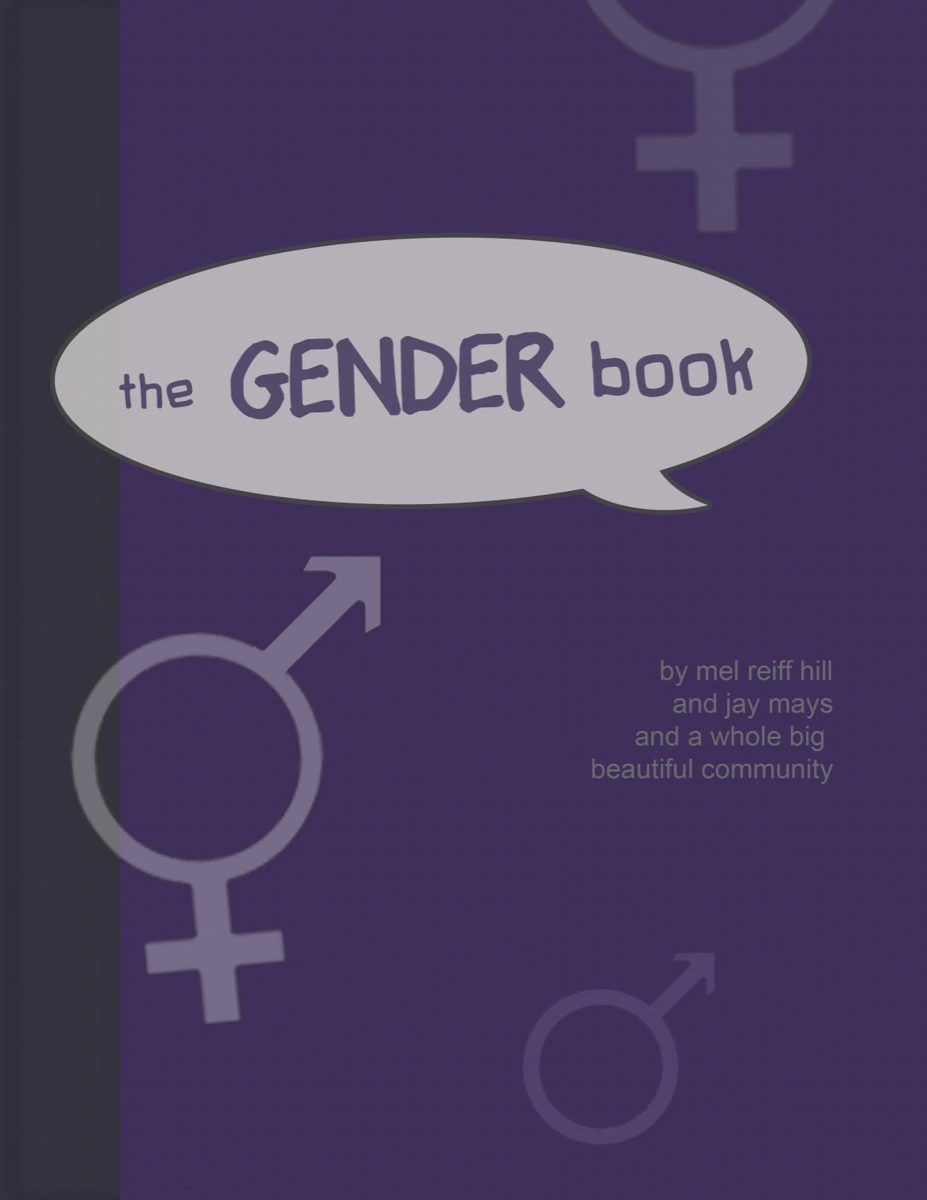
The Gender Book
An illustrated book that explores gender identity, expression, and the socialization of gender. It is available as a downloadable e-book on a donation-based pay-what-you-want basis or as a hardcover book. All proceeds go toward a scholarship.
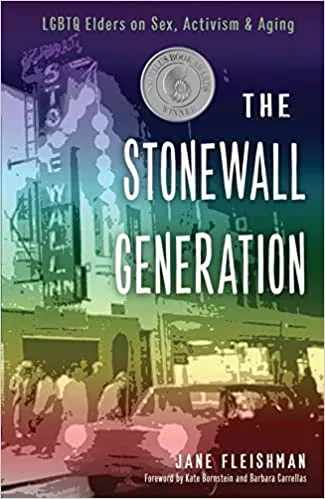
The Stonewall Generation
Sexuality researcher Jane Fleishman shares the stories of fearless elders in the LGBTQ community who came of age around the time of the Stonewall Riots of 1969.
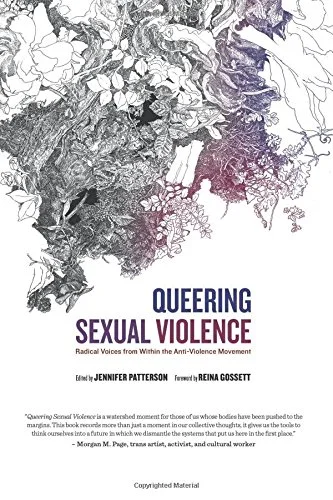
Queering Sexual Violence
An anthology that puts queer, transgender, and gender non-conforming survivors at the center of the anti-violence movement and creates a space for their voices to be heard.
Other Recommended Publications
| NSVRC Sexual Violence & Individuals Who Identify as LGBTQ This information packet contains nearly a dozen resources focused on serving, engaging, and collaborating with individuals and communities who identify as lesbian, gay, bisexual, transgender, queer or questioning. The packet contains resources to support counselors, advocates, preventionists, technical assistance providers, and allied professionals committed to affirming all individuals and communities. | |
| Injustice at Every Turn: A Report of the National Transgender Discrimination Survey This report is the most extensive survey of transgender discrimination ever undertaken. Over 6,450 responses are included in the survey, which explored discrimination in all aspects of life. | |
| CDC National Intimate Partner and Sexual Violence Survey This 2010 report discusses the rates of intimate partner violence and domestic violence experienced by LGBTQ+ people. | |
| Creating Safer Spaces for LGBTQ Youth: A Toolkit for Education, Healthcare, and Community-Based Organizations This Toolkit has been developed to assist individuals, community-based organizations, providers, healthcare staff, educators, and others that see the value of incorporating key safer space components into their organizations so that young people survive and thrive. Recommendations serve as a guide and should be tailored to each individual young person and organizational setting. View Here |
Recommended Documentaries
| (A)sexual A documentary that focuses on asexuals — people who experience no sexual attraction — as they struggle to claim their identity in a sex-obsessed culture and face a mountain of stereotypes and misconceptions. | |
| Rape for Who I Am A documentary based in South Africa where homophobia is being ‘expressed’ through targeted rape of Black lesbians. Four extraordinary women expose the harrowing experiences and struggles of African lesbians. | |
| No! The Rape Documentary No! The Rape Documentary is an award-winning documentary that features riveting testimonials from Black women rape survivors who defy victimization. |
Recommended Videos
Download Posters and Brochures
| Title | Content | Image | Link |
|---|---|---|---|
| LGBTQ Palm Card | |||
| LGBTQ Brochure Spanish | |||
| LGBTQ Brochure English | |||
| LGBTQ Poster English | |||
| LGBTQ Poster Spanish |
Palm Cards
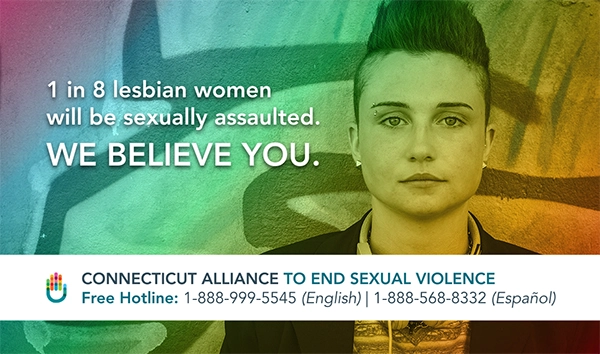
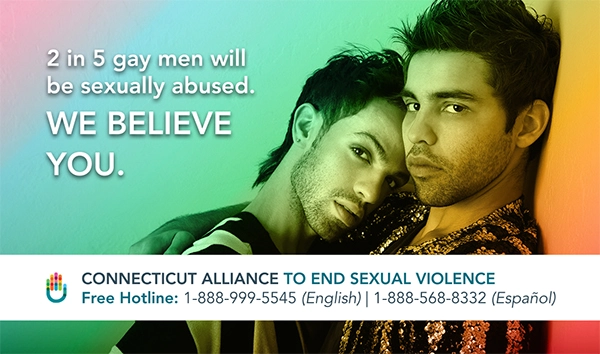
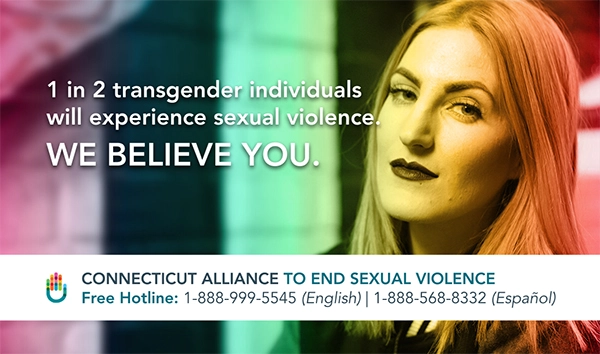
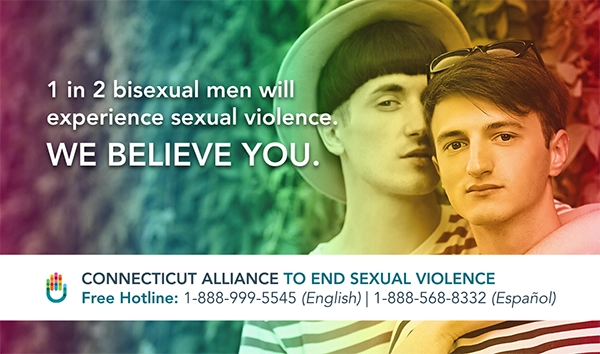
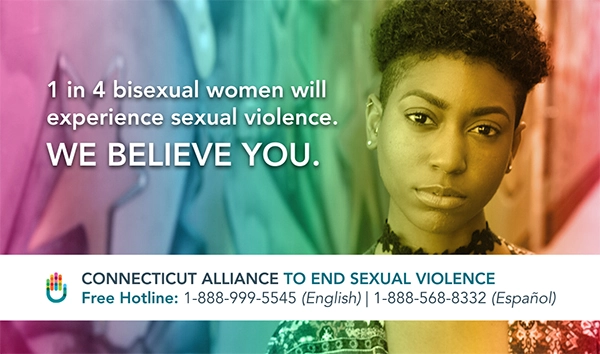
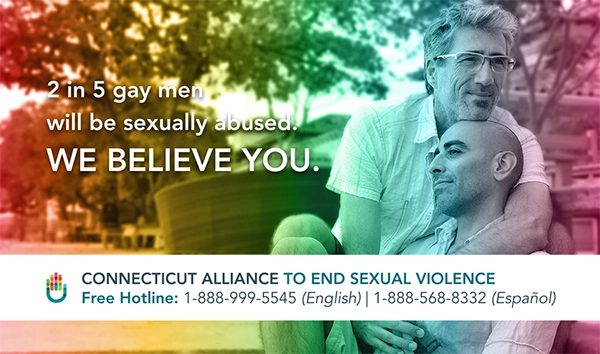
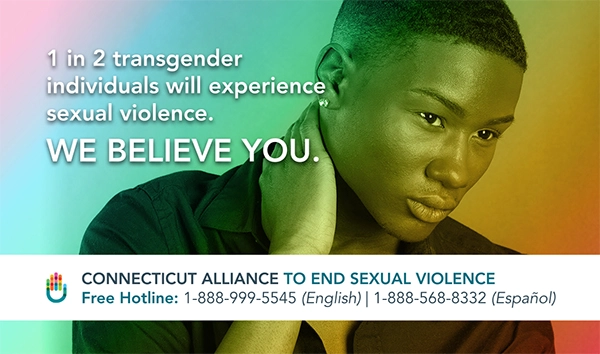
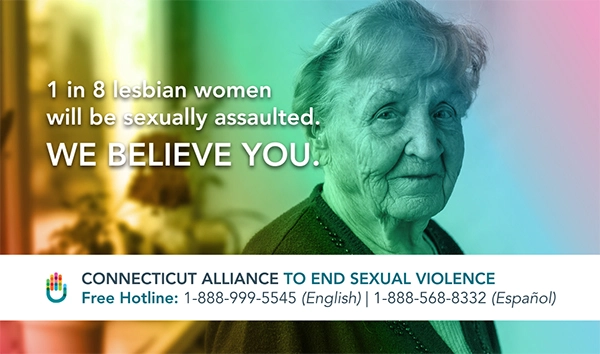
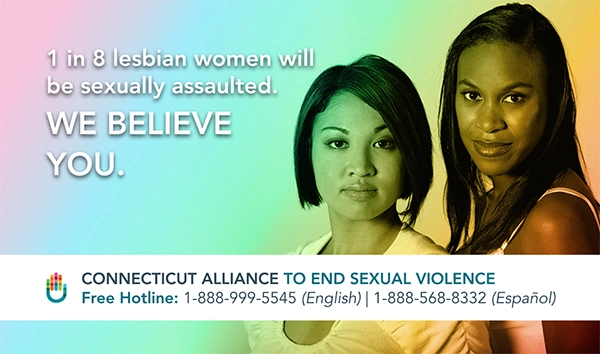
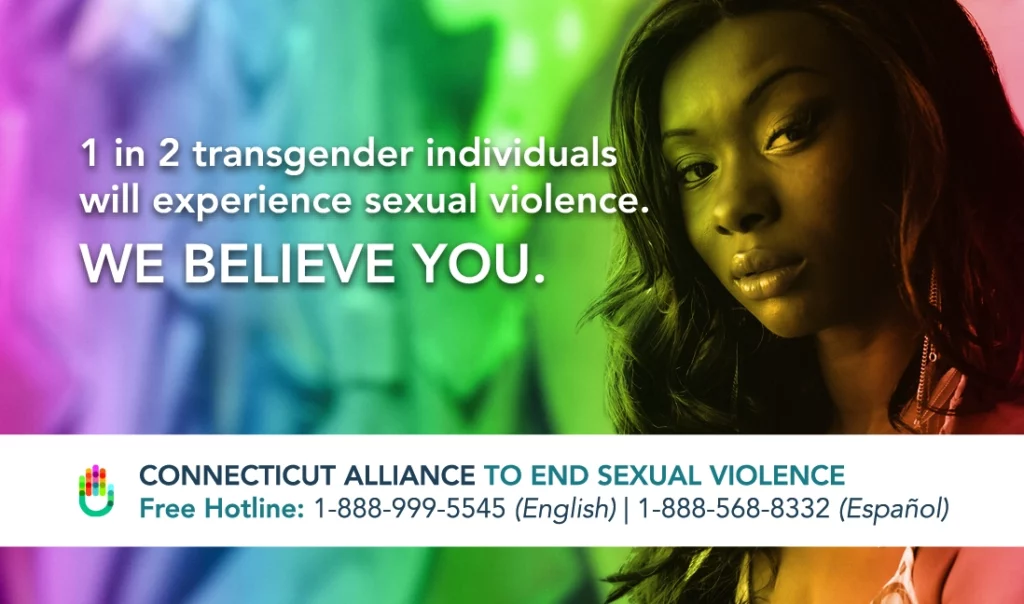
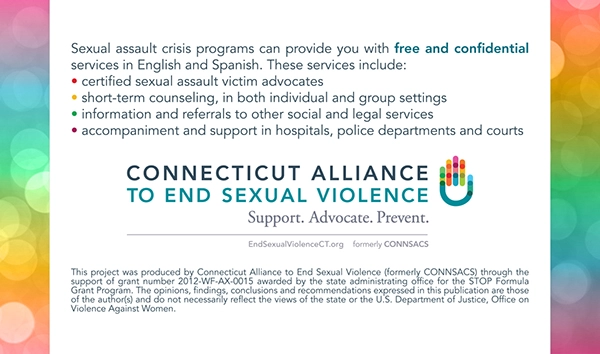
Materials were produced by the Connecticut Alliance to End Sexual Violence through the support of grant number 2012-WF-AX-0015 awarded by the state administrating office for the STOP Formula Grant Program. The opinions, findings, conclusions, and recommendations expressed in these publications are those of the author(s) and do not necessarily reflect the views of the state or the U.S. Department of Justice, Office on Violence Against Women.
Sources of Statistics
Human Rights Campaign: Sexual Assault and the LGBT Community
NISVS: An Overview of 2010 Findings on Victimization by Sexual Orientation
NISVS: 2010 Findings on Victimization by Sexual Orientation
How to Be an Ally
What is allyship?
Ally is a verb, not a noun.
Allyship is a consistent action to unlearn and re-evaluate your own privilege, prejudice, and bias; it is using your privilege to act in solidarity with LGBTQ+ people. An ally is someone who publicly and privately supports and advocates for LGBTQ+ people, even when they are not present in the room. An ally strives to learn and understand the LGBTQ+ community and the barriers they face, as well as join the fight for equality for all.
How to be an ally.
- Continuously learn about the spectrum of sexualities and gender identities of the LGBTQ+ community.
- Do not expect others to educate you.
- Develop an understanding of the barriers created by homophobia, transphobia, and general discrimination of the LGBTQ+ community and how to challenge these ideas.
- Respect and practice the usage of pronouns in your day-to-day life.
- Commit to challenging your personal beliefs, prejudice, and implicit bias. This includes challenging your social circles, such as friends, family, coworkers, etc.
- Understand the coming-out process and realize that this is not your story to share with others. This could put the LGBTQ+ person in danger, so it is integral to respect their privacy.
- Hold yourself accountable for any potential harm you may cause, even when unintentional.
- Be able to accept criticism and grow from this process.
- Actively acknowledge your privilege and the oppressive systems from which your privilege comes.
- Listen to and amplify the voices of LGBTQ+ people.
